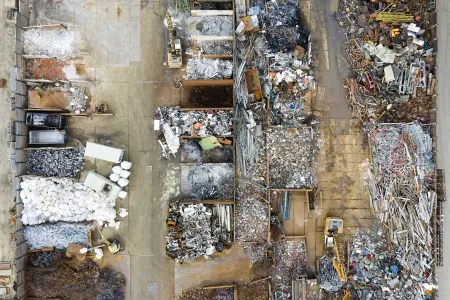News
For circular economy model to work, we need to value waste, says a CDU expert
People’s attitudes towards waste needs to change substantially with a value put on our rubbish, if we are serious about reusing resources, a Charles Darwin University (CDU) researcher says.
CDU sustainability expert Michael Odei Erdiaw-Kwasie said that right now we do not value waste as we should - a vital psychological hurdle to achieving circular economy goals across sectors.
A circular economy is where spent resources are reused and repurposed to remain valuable, so there is no waste.
Dr Odei Erdiaw-Kwasie described the circular economy as a second chance to look at the inherent value of waste – a chance to see the valuable resource in the End-of-Life waste.
“There is a real problem in that right now, we don’t put any value on waste,” Dr Odei Erdiaw-Kwasie said.
"What even complicates matters further is sheer interests among many to own products or items than leasing or renting. Now is the time for us to approach the circular economy agenda sector by sector because the solution will differ for different sectors, and some lessons still remain for other sectors.”
Dr Odei Erdiaw-Kwasie made the comments after publishing a research article in the Journal of Cleaner Production this month into the circular economy.
Dr Odei Erdiaw-Kwasie cautions that some sectors, like the service sector, are falling into the same trap that the manufacturing sector fell into decades ago. Some sectors are focusing on the wrong goal when it comes to implementing the circular economy,” he said.
“No matter the sector, for a circular economy to work, actors have to be aware that waste has value.”
The electronic sector, for example, is one that has fallen into this trap for a long time. The status quo has been a ‘throwaway’ sector – malfunctioning electronics are wastes and nothing else, Dr Odei Erdiaw-Kwasie found.
“Although E-waste continues to grow as a problem, recent initiatives targeting anthropogenic stock seem to pose new hopes to the electronic sector.
“Now we are seeing massive growth in what has been termed urban mining because e-waste is perceived to have value because they still have precious minerals inside.”
Dr Odei Erdiaw-Kwasie said economies such as the United States and China have invested heavily in urban mining because they now see value in their e-waste, while places like Australia and India are still lagging.
Related Articles

First “hype cycle” of AI development put tech above humans
Users around the world have rushed to adopt artificial intelligence - especially in safety-critical fields - but a new study has revealed the hype has prioritised technology for technology’s sake instead of human-centred development.
Read more about First “hype cycle” of AI development put tech above humans
Nanoplastics hindering cognitive abilities of fish, international research shows
Nanoplastic exposure can impair the cognitive abilities of fish and could lead to significant impacts on marine species’ ability to survive, according to a new international study.
Read more about Nanoplastics hindering cognitive abilities of fish, international research shows
New project to grow Indigenous aquaculture on one of Australia’s largest islands
An Australian island’s efforts to improve food security and transition into a blue economy will be bolstered by a new project to propagate a nutritious and increasingly popular fish.
Read more about New project to grow Indigenous aquaculture on one of Australia’s largest islands
